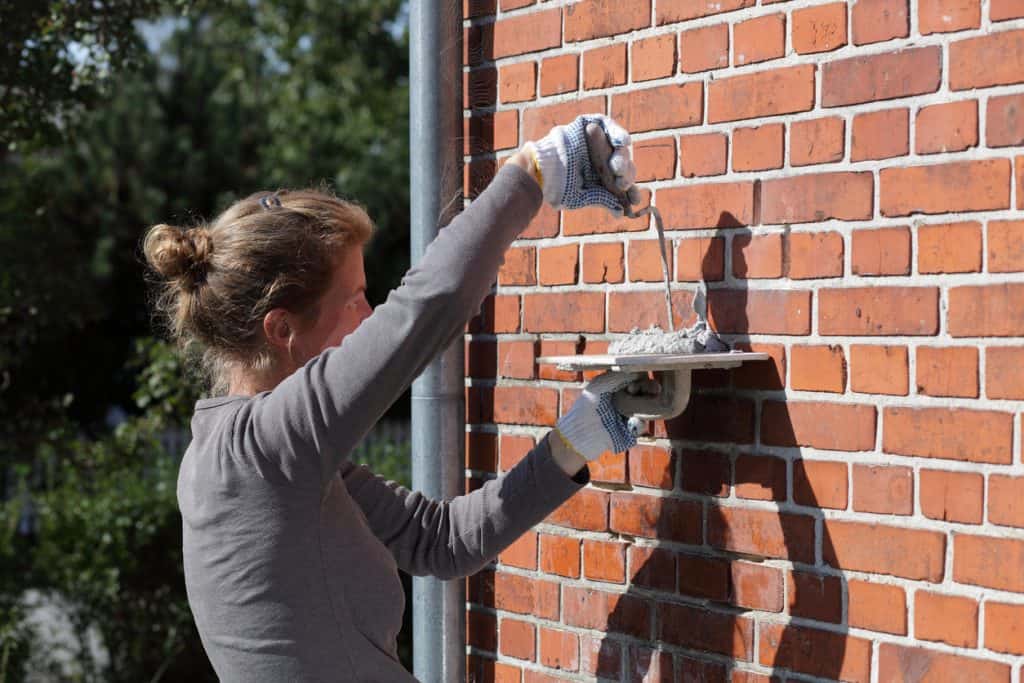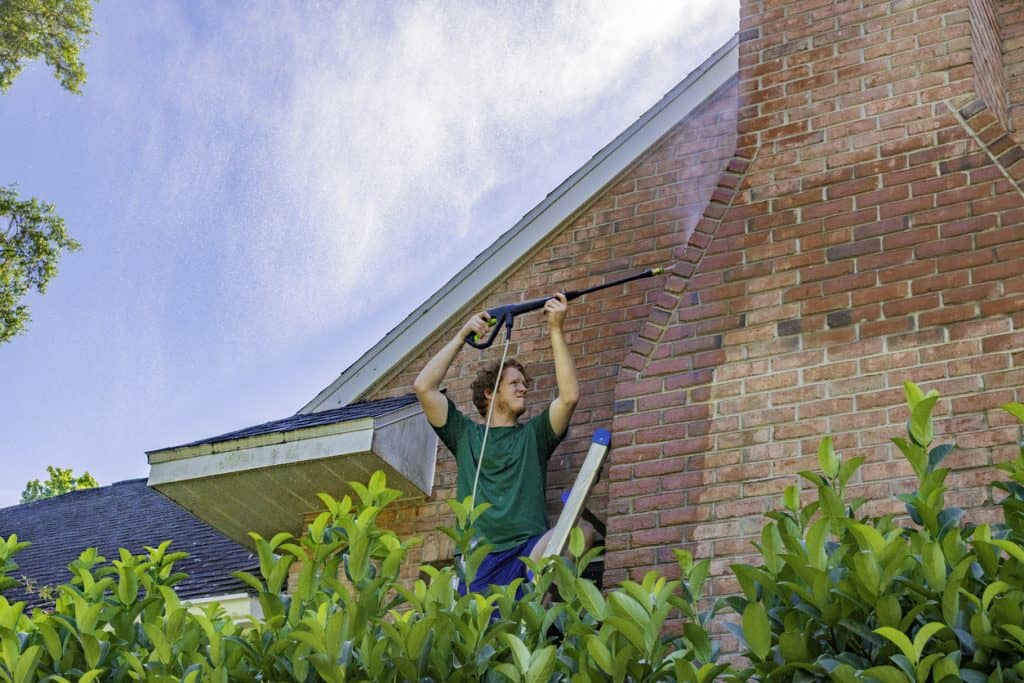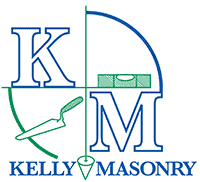Brick masonry is a durable and beautiful addition to any home or outdoor space, providing strength, stability, and timeless appeal. However, like any structural material, it requires regular maintenance to ensure it stays in top condition. Over time, exposure to the elements, wear, and tear can cause your brickwork to deteriorate, leading to costly repairs. Whether it’s the chimney, patio, or exterior wall, properly caring for your masonry helps protect your investment and extend its lifespan.
In this blog post, we’ll share some essential and easy-to-follow tips to maintain your brick masonry. These tips will help you keep your brick surfaces looking their best while preventing significant damage. Let’s dive into the best ways to clean, seal, and repair your brickwork to maintain its strength and beauty for years to come.
Keep It Clean: Regular Cleaning and Inspection
Why Regular Cleaning Is Essential for Brick Maintenance
Over time, dirt, moss, and mildew can accumulate on the surface of your brickwork, causing discoloration and promoting decay. Regular cleaning is an important part of masonry care, as it helps to remove these contaminants before they can damage the brick or mortar. While brick is known for its durability, it is still susceptible to the elements, which can cause mold, algae, or lichen to form on its surface, particularly in damp or shaded areas.
A simple cleaning routine is all it takes to maintain your brick masonry. Use a soft-bristled brush to scrub the surface gently. Avoid using abrasive tools that could scratch or damage the bricks. When cleaning, consider using a mild detergent or a brick-specific cleaner mixed with water to eliminate stains, moss, and grime without harming the material. Regularly inspecting your brickwork during the cleaning process will also allow you to identify minor issues, like small cracks or gaps, that can be repaired before they worsen.
How to Inspect for Damage During Cleaning
While cleaning your brick masonry, it’s essential to inspect it for cracks, crumbling mortar, or other signs of wear. Small cracks are easy to overlook, but they can lead to significant damage if left untreated. For instance, water can seep into the cracks, causing the mortar to weaken and further damage the structure. It’s also important to check the mortar joints between the bricks, as these areas are vulnerable to wear over time.
Take the time to walk around the entire area of masonry, checking both the visible and hidden sections. Look for any areas where the mortar has become loose or where bricks may be shifting. If you notice any damage during your inspection, address it promptly with a quick patch or call in a professional for more significant repairs. By staying proactive with regular cleaning and inspections, you’ll keep your masonry in great shape for years to come.
Protecting Your Masonry: Addressing and Preventing Cracks
Understanding the Importance of Crack Prevention
Cracks in your brick masonry can be caused by various factors, including shifts in the foundation, moisture expansion, or the natural aging process of the material. These cracks may appear as hairline fissures or larger gaps in the mortar. While small cracks may not seem like a big concern, they can lead to significant structural damage if left untreated. Water can seep into these cracks, leading to further deterioration of the mortar and the bricks, especially during freezing conditions.
To prevent cracks from forming, it’s important to keep an eye on the structural stability of your brickwork. Regularly check for signs of foundation movement, such as shifting or uneven brick patterns. If you live in an area that experiences frequent temperature fluctuations, it’s even more important to ensure that your masonry is sealed properly to prevent moisture from getting inside the structure. Additionally, address any cracks or gaps as soon as you spot them to prevent them from expanding and leading to costly repairs later on.
How to Repair Small Cracks
Repairing small cracks in your brick masonry is a straightforward process that can often be done without professional help. For hairline cracks, you can use masonry caulk or a mortar repair compound to fill in the gaps. Before applying the sealant, make sure the area is clean and dry to ensure proper adhesion. If the crack is large or if it affects the structural integrity of the masonry, it’s best to call in masonry experts who can handle the repair with the necessary tools and expertise.
In addition to addressing existing cracks, make sure your mortar joints are intact. Repointing mortar joints—especially in older brickwork—can strengthen the structure and prevent moisture from seeping in. Repointing is a relatively simple process where the old mortar is removed, and new mortar is applied to the joints, creating a tight seal. This step will not only prevent cracks but also restore the original appearance of your masonry.
Essential Protection: Waterproofing Your Brickwork
Why Waterproofing Is Crucial for Brick Masonry
Brick is porous, which means it absorbs moisture from the environment, especially when exposed to rain or snow. Without proper waterproofing, this moisture can penetrate the surface, leading to efflorescence (white powdery stains), mold, and even the weakening of the mortar. In colder climates, trapped moisture can freeze and expand, causing the bricks to crack or spall (break apart). Waterproofing your masonry helps prevent these issues and keeps your brick surfaces strong and resilient.
Applying a waterproofing sealant is an effective way to protect your brick masonry from water damage. The sealer forms a protective barrier on the surface, preventing water from being absorbed into the bricks while still allowing the material to breathe. It’s essential to choose the right type of sealer based on the climate and the specific needs of your masonry. For best results, apply a high-quality masonry water repellent that is designed to withstand the harsh effects of moisture and weathering.
How to Apply a Waterproof Sealant
Before applying a waterproof sealant, ensure that the brick surface is clean and free of dirt, mold, or algae. Apply the sealant evenly using a paintbrush or roller, covering the entire surface of the masonry. Be sure to follow the manufacturer’s instructions for the best application method, and allow the sealant to dry completely before exposing it to moisture. Reapply the sealant every few years, especially if the surface begins to show signs of wear. With regular waterproofing, your brick masonry will be protected from the elements and maintain its integrity for many years.

Keeping the Joints Strong: Maintaining Mortar Joints
Why Mortar Joints Matter for Brickwork Durability
The mortar joints between bricks are critical to the overall strength of your masonry. They hold the bricks together and help absorb stress from movement and temperature changes. Over time, however, mortar can erode or crack, compromising the stability of your masonry. When mortar joints are compromised, they allow water to seep in, causing further damage to both the mortar and the bricks themselves.
To keep your masonry strong, it’s important to inspect the mortar joints regularly. Look for signs of crumbling or loose mortar, especially after heavy rains or freezing weather. If the mortar is deteriorating, it’s important to replace it as soon as possible to prevent structural damage. A good rule of thumb is to replace mortar that’s more than 1/4 inch deep, as it’s no longer serving its intended purpose of holding the bricks together.
How to Repoint Mortar Joints
Repointing is the process of replacing old or damaged mortar with fresh mortar to restore the integrity of your masonry. To repoint, the old mortar must first be removed using a specialized tool. Once the damaged mortar is cleared, the new mortar is applied carefully to the joints. Repointing requires skill to ensure the mortar matches the original consistency and color of the existing material. If you’re not comfortable with this task, it’s best to contact masonry professionals who can handle the job with precision and expertise.
Efflorescence: What It Is and How to Eliminate It
What Causes Efflorescence and Why It’s Harmful
Efflorescence appears as white, powdery stains on the surface of brick masonry. It’s caused by the migration of salts within the brick and mortar when water evaporates from the surface. While efflorescence itself is harmless, it can indicate that there is excessive moisture within the masonry, which may lead to more significant issues, such as mold growth or weakening of the structure. If left untreated, efflorescence can also affect the aesthetic appeal of your brickwork.
To prevent efflorescence, it’s important to address the root cause of the moisture buildup. This could involve improving drainage around the foundation or applying a waterproof sealant to reduce water penetration. In some cases, the issue may be due to a plumbing leak, so it’s essential to identify and resolve any sources of moisture to prevent efflorescence from recurring.
How to Remove Efflorescence
Efflorescence can be removed using a mixture of water and vinegar. Spray the affected area with the solution and scrub gently with a soft-bristled brush. Be sure to rinse the area thoroughly afterward to remove any residue. If the efflorescence persists, you may need to use a stronger cleaning solution designed for masonry surfaces. However, the key to preventing efflorescence from returning is addressing the underlying moisture issue. Once the source of moisture is fixed, the likelihood of efflorescence reappearing will be significantly reduced.
When to Call in the Pros: Professional Masonry Repairs
Why You Might Need Professional Help
While many brick maintenance tasks can be handled by homeowners, there are certain situations where it’s best to call in the experts. Major cracks, structural issues, or large-scale repairs require the knowledge and experience of masonry professionals to ensure the job is done right. Additionally, if your masonry is severely damaged or requires restoration, a professional will have the necessary tools and expertise to complete the work to the highest standards.

Hiring a masonry expert ensures that your brickwork is in capable hands. These professionals have the right equipment and skills to handle everything from minor repairs to complete masonry restoration projects. They will also be able to identify potential problems that may not be visible to the untrained eye, ensuring that your masonry is maintained properly and that any underlying issues are addressed before they cause further damage.
FAQ Section: Common Questions About Brick Masonry Care
1. How often should I clean my brick masonry? Regular cleaning is recommended at least once a year, but you may need to clean more frequently if you live in a damp climate or near trees that shed leaves and debris.
2. How do I know if my mortar joints need repointing? If you notice visible gaps, crumbling, or missing mortar between the bricks, it’s time to repoint. The mortar should also feel firm when you press on it—if it’s soft or crumbly, it needs attention.
3. Is waterproofing my brick masonry necessary? Yes! Waterproofing prevents water from seeping into the bricks and mortar, which can cause long-term damage such as cracking or mold growth.
4. Can I repair small cracks myself? For minor cracks, you can use a masonry caulk or mortar repair compound. For larger or more serious cracks, it’s best to consult a masonry professional.
5. How can I prevent efflorescence from forming? Ensure proper drainage around your brickwork and apply a waterproofing sealant. Address any plumbing leaks or moisture issues promptly.
6. When should I hire a professional for masonry repairs? If you notice significant cracks, structural issues, or damage beyond simple cleaning, it’s time to hire masonry repair experts to ensure the safety and integrity of your brickwork.
Trust Kelly Masonry for Expert Masonry Services
Proper care and maintenance are essential to ensuring your brick masonry lasts for decades. From cleaning and inspecting your brickwork to sealing and repairing cracks, following these simple tips will help preserve the beauty and strength of your masonry. However, for more significant repairs or professional-grade services, it’s always a good idea to trust the experts.
At Kelly Masonry, we offer comprehensive masonry repair and maintenance services for both residential and commercial properties in the Main Line area. Our team of masonry experts can handle everything from minor repairs to full restorations, ensuring that your brick masonry is in the best possible shape. Visit Kelly Masonry to learn more about how we can help with your masonry needs!
